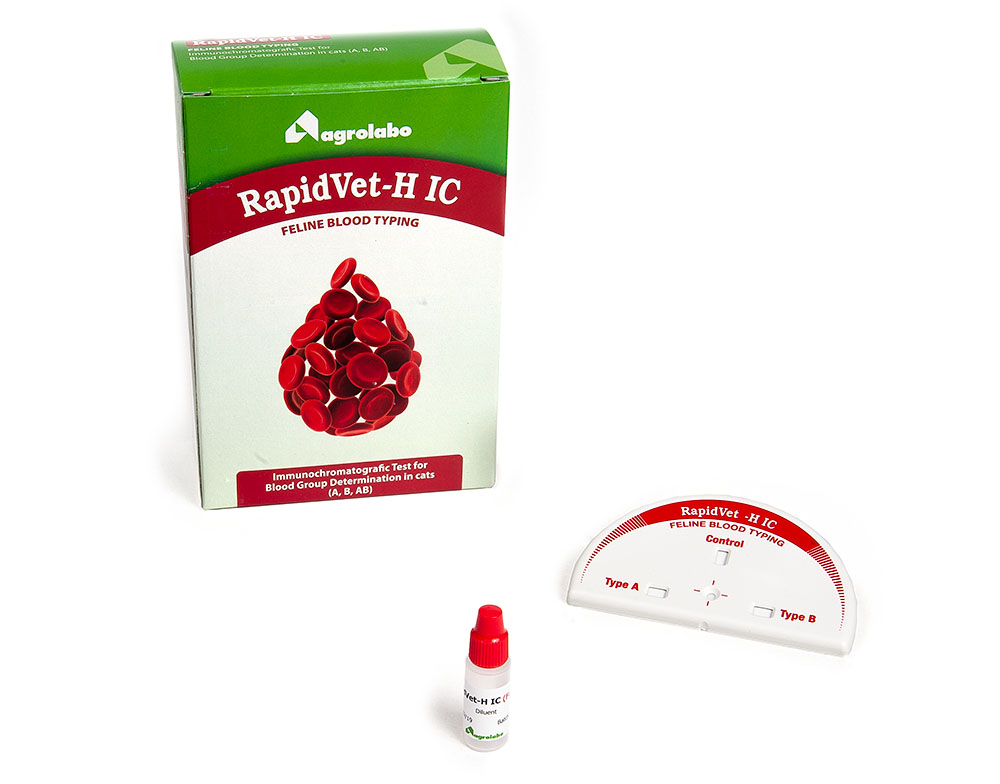RapidVet-H IC Feline
Rapid test for the detection of blood group A, B, AB with IgM monoclonal antibodies.
RapidVet-H IC Feline is an immunochromatographic test for the detection of blood groups in cats with IgM monoclonal antibodies.
Blood groups in cats consists of two antigens expressed either alone or in combination: A, B and AB, but unlike dogs, cats contain natural iso-antibodies against the antigens on the surface of the red blood cells, which makes blood transfusions problematic.
The frequency of blood groups is variable between the breeds. Most cats have type A antigens and low titers of natural anti-B antibodies. Conversely, type B cats have high anti-A natural antibody titers. Group B is more common in the following breeds British Short hair, Devon Rex, Cornish Rex, Ragdoll, Burmese, Persian, Hymalaia, Abyssin-Somala and Sphynx.
Group AB cats are rare and have both A and B-type antigens on the erythrocyte membrane and do not develop natural anti-A and anti-B antibodies.
Knowing the blood group in cats is important both in transfusion medicine to prevent blood transfusion reactions, and in the reproductive field, to prevent the onset of neonatal isoerythrolysis (NI).
| Blood groups in cats
Blood groups in cats consists of two antigens expressed either alone or in combination: A, B and AB, but unlike dogs, cats contain natural iso-antibodies against the antigens on the surface of the red blood cells, which makes blood transfusions problematic. The frequency of blood groups is variable between the breeds. Most cats have type A antigens and low titers of natural anti-B antibodies. Conversely, type B cats have high anti-A natural antibody titers. Group B is more common in the following breeds British Short hair, Devon Rex, Cornish Rex, Ragdoll, Burmese, Persian, Hymalaia, Abyssin-Somala and Sphynx. Group AB cats are rare and have both A and B-type antigens on the erythrocyte membrane and do not develop natural anti-A and anti-B antibodies. Knowing the blood group in cats is important both in transfusion medicine to prevent blood transfusion reactions, and in the reproductive field, to prevent the onset of neonatal isoerythrolysis (NI). If type B cats are transfused with type A blood, they develop an immediate systemic anaphylactic, sometimes fatal reaction, since they have high anti-A antibodies titers. Type A cats that have low anti-B antibody titres develop only a weak reaction when they are transfused with type B blood, but the erythrocytes have a shorter biological half-life, which affects the course of the disease. Type AB cats do not exhibit transfusion reactions based on type A or B incompatibility and may receive both type A and B blood. Neonatal isoerythrolysis occurs when a type A kitten is born to a type B and a type A cat. The anti-A maternal antibodies in the colostrum are absorbed by the kittens in the first 24 hours of life. Consequently, emolytic anemia and death can occur within the first 2-3 days of life. If blood typing is performed on healthy cats and reproducers, it can preventively reduce the transfusion reactions and minimize the neonatal isoerythrolysis. |
